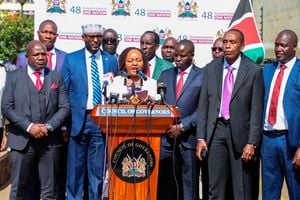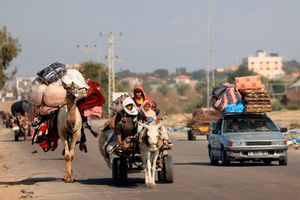
Alcohol abuse is an existential threat to Kenya, although tough edicts have always been made without effect.
There is no doubt that alcohol abuse presents an existential threat to this country. A walk through the streets of any town in Kenya, maybe other than alcohol-free Kijabe, will reveal people of all ages staggering around in drunken stupor or blacked-out in ditches and sidewalk.
Across many parts of the country, men, in particular, have gone completely to waste, unable to hold down jobs or fulfill their family and community responsibilities. The government, therefore, has the responsibility to do everything within its power to arrest the slide into a zombified nation.
However, it is going about the wrong way. What we see are knee-jerk responses in Deputy President Rigathi Gachagua approaching it from a provincial Mt Kenya regional viewpoint, Interior Cabinet Secretary Kithure Kindiki taking the national security perspective or Kirinyaga Governor Ann Waiguru ordering closure of all bars within her fiefdom.
Mr Gachagua does mean well with his deep concern on rampant alcoholism in the Mt Kenya region. However, alcoholism is a national problem, not one uniquely in his backyard. Mr Gachagua would do well to constantly remind himself that he is Deputy President of Kenya, not Deputy President of Mt Kenya.
The campaign spearheaded by the Deputy President got strong support last week when Prof Kindiki announced a raft of measures against the production, distribution and consumption of illicit alcohol. Unfortunately, as evidenced with his premature declaration of victory in the war against bandits and cattle rustlers who rule the northern Kenya badlands, the man in charge of national security often barks louder than he can bite. The good professor did not actually say anything new beyond echoing the stale tale of a Mt Kenya endangered, and restating existing laws.
Tough edicts of the sort made last week have been made since time immemorial to absolutely no effect. They only benefit police officers on patrol, who can demand more in the daily extortion rackets that entice them to look the other way so that bars can operate beyond their licensed hours.
The other problem is that policy-making by roadside pronouncements principally hits the formal and legal legs of the alcohol manufacturing and distribution business while having absolutely no impact on the thriving underground trade.
The biggest mistake is in tackling the vice through a skewed law and order diktat rather than taking a more holistic approach. The government is intent on disrupting the supply chain but neither that nor anything approaching prohibition has ever worked against what is, clearly, a major societal problem beyond availability of cheap liquor.
No amount of bans, prohibitions, controls and the strong arm of the law will prevent a determined alcoholic from getting their daily fix. The most that is achieved is driving the trade deeper underground, where all forms of regulations and quality standards are non-existent.
The only effective way to manage alcoholism is by finding out what drives virtually an entire populace to the demon drink in the first place. It is not about availability of cheap liquor but the level of hopelessness, despair and helplessness within the population.
We are talking here about failures of leadership. A people who, for years, have been lied to by incompetent, corrupt, greedy selfish leaders and have lost all hope for a prosperous future will drown their miseries in drink and drugs.
What the government must, therefore, do is address the root causes rather than just descending on the symptoms with guns and truncheons. It must also cease the hypocrisy, where those in leadership fulminate about the scourge of alcoholism yet sit side by side with confirmed alcoholics in cabinet meetings.
That must remind us of the public rhetoric about fighting corruption yet it often appears that well-documented records of theft and sleaze are vital in the CV of anyone seeking a high-ranking government position.
There is also the discriminatory approach that tackles alcoholism as primarily a scourge afflicting the lower classes who consume cheap liquor. The rich and mighty drinking themselves silly on single malt whiskies in high-end clubs while watched over by government bodyguards, chauffeurs and assorted flunkies are spared the crackdowns.
We also stand reminded that, when the then-government of President Uhuru Kenyatta cracked down on manufacturers of illicit and counterfeit alcohol and tax evasion, those now crying loudest in President Ruto’s government were at the time crying foul over an alleged threat to Mt Kenya enterprise. When they assumed power, one of their first actions was to ensure that the closed brewers and distilleries were free to resume business. They are reaping what they sowed.
[email protected]. @MachariaGaitho










